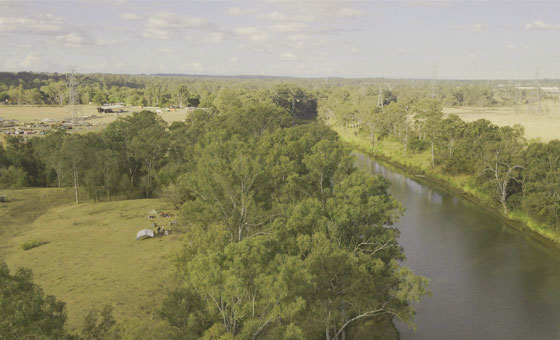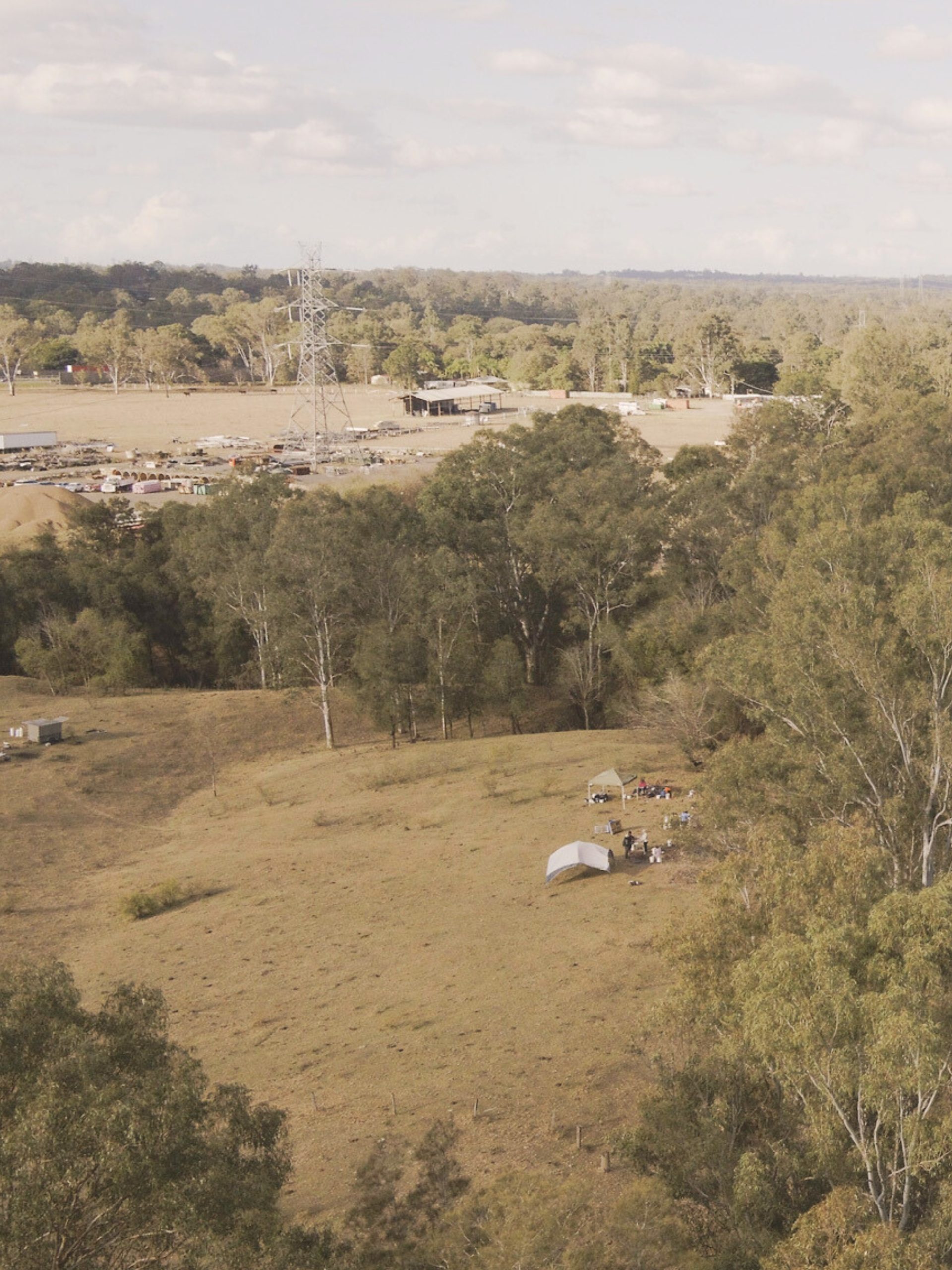Project Description
Overview
Help uncover industrial history in Ipswich, southeast Queensland, Australia. This 19th century site has never previously been excavated nor has any similar site been excavated in Australia. Our project seeks to reveal information pertaining to the socio-economic and industrial conditions present within this self-contained township, 1848-1880. Additionally, we want to learn more about the South Sea Islander and Aboriginal communities that were known labourers on the property and throughout the broader region of Queensland, Australia.
The remains of Town Marie are now located on a private cattle grazing property on the outskirts of Brisbane. Getting to the excavation area requires a short walk, including traversing up and down some moderate slopes and navigating a short creek crossing via a bridge. The site is situated on the banks of the Bremer River in Ipswich. The excavation season takes place during the Australian winter, meaning the mornings are chilly (0°-10°C/30-50°F) but warm up throughout the day (approx. 25°C/70°F). This field school provides insight into early Ipswich and Queensland industry and entrepreneurship. Town Marie boasts the remains of an industrial scale boiling down works. This intriguing industry rendered the fat from sheep and cow carcasses to produce tallow, which was included in many products such as soap and candles. As such, animal bone and charcoal are key find types, therefore zooarchaeology, archaeobotany and historical archaeology are specializations all participants will engage with. Participants will learn more about Australian cultural heritage management and learn about assessing the significance of enigmatic sites like Town Marie.
| Course Details | |
|---|---|
| Course Dates | June 16 – July 13, 2024 |
| Course Type | Archaeology |
| Instructors | Dr. Serena Love & Dr. Benjamin Schoville |
| Credits* | TBA semester (quarter) |
| Apply By | April 1 |
| Fees Due By | Summer 1 (May 1) |
| Program Fees | |
|---|---|
| Tuition | $4,475 |
| Transcript Fee* | $300 |
| Health & Evacuation Insurance | $125 |
| Room & Partial board (lunches) | $2840 |
| TOTAL: | $7,740 |
Applications accepted on a rolling basis until program fills or final deadline above.
Instructors
The directors welcome emails and inquiries about the research elements of this project. More general information (tuition, health insurance, and payment schedule) can be found under the ‘Students’ tab above. Any further questions may be addressed to IFR staff. Additional details about research, course schedule, travel, accommodation, and safety can be found on the syllabus. Contacting the directors or the IFR office is encouraged and appreciated. It may help you determine if this field school is a good fit for you.
Testimonials
This is a new IFR field school. No student testimonials are available at this time.
Payment & Student Fees
Application Fee: There is a $45 fee to submit an online application.
Deposit Payment: A nonrefundable $500 deposit is due within 3 weeks of program acceptance in order to secure your place. The remainder of your program fees are due by the deadline indicated under “Course Details”.
*Transcript Fee & Academic Credit Opt Out: If you wish to participate in an IFR field school without earning academic credits, you will not be charged a transcript fee.
For more information about payment, fees, and policies, please see details under our Payment & Finances and Withdrawal and Cancellation Policy pages.
Accommodations
All students will be staying in serviced hotel apartments in downtown Brisbane. Sleeping spaces will fit two single beds (2 students) per room. Apartments will have 2-3 sleeping spaces; therefore 4-6 students will be in each apartment. The apartment has a kitchen and students will be able to cook meals as needed within the apartment. Each apartment has laundry facilities (washing machine and dryer), so students can wash as required. Each apartment also has at least one bathroom (shower, sink and toilet). The apartment will be serviced weekly by hotel staff.
Meals: Morning tea and lunch will be provided on the weekdays at the field school, but no other meals are included in the program fee. Students will be responsible for their own breakfasts and dinners, as well as lunches on the weekends. Downtown Brisbane has several dining/take away options and there are numerous grocery stores within easy walking distance from student accommodations. Students must inform Everick of any dietary requirements or allergies so the program can ensure snacks and lunch items at the field school are suitable for all participants.


Travel Info
Natural disasters, political changes, weather conditions and various other factors may force the cancellation or alteration of a field school. IFR recommends students only purchase airline tickets that are fully refundable and consider travel insurance in case a program or travel plans must change for any reason.
General information for this program is below, but keep in mind we will discuss any updated travel information and regulations during the required program orientation, which could affect travel plans.
Students will need to make their way to Brisbane. They may fly directly to Brisbane or may arrive in Sydney (SYD) or Melbourne From there, students can take a train to Roma Street Station and walk approx. 5-10 minutes to your accommodation.
An Everick staff member will pick participants up at a pick up point near their accommodation and drive them to site every day and drop them back again in the afternoon. The trip is about 30 minutes in the morning but can extend to 45 minutes in the afternoon. You will be provided with information about the field school drop off and pick up point (approx. 5 minute walk from accommodation location).
VISA REQUIREMENTS
According to US Department of State, US citizens are requires to have a valid passport and Electronic travel Authority (ETA) to enter Australia (for short term travel).
You must apply for your ETA via the ETA App. Please follow the steps outlined here. You will receive your ETA within 24 hrs of applying.
Citizens of other countries are asked to check the embassy website page at their home country for specific visa requirements.
Student Safety
The IFR primary concern is with education. Traveling and conducting field research involve risk. Students interested in participating in IFR programs must weigh whether the potential risk is worth the value of education provided. While risk is inherent in everything we do, we do not take risk lightly. The IFR engages in intensive review of each field school location prior to approval. Once a program is accepted, the IFR reviews each program annually to make sure it complies with all our standards and policies, including student safety.
Students attending IFR international programs are covered by a comprehensive Health Insurance policy that includes physical illness or injury, mental or chronic conditions. No deductible and 100% of costs are covered up to $250,000. In addition, we provide Political and Natural Disaster Evacuation policy, which allow us to remove students from field school location if local conditions change. Our field school directors are scholars that know field school locations and cultures well and are plugged in into local communities and state institution structures.
Students attending IFR domestic programs (within the US) must have their own health insurance and provide proof upon enrollment. IFR field school directors are familiar with local authorities and if in need of evacuation, local emergency services and/or law enforcement will be notified and activated.
The IFR has strong, explicit and robust policy towards discrimination and harassment in the field. If students feel they cannot discuss personal safety issues with field school staff, the IFR operates an emergency hotline where students may contact IFR personnel directly.
Call (877-839-4374) or email (info@ifrglobal.org) if you have questions about the safety of any particular program.









